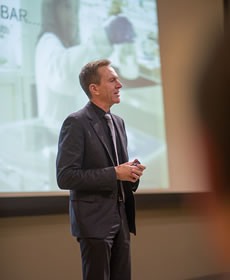Trevor Mundel: Global Health Needs Innovation
 Increased innovation and technology are vital to global health, Dr. Trevor Mundel, president for global health at the Bill & Melinda Gates Foundation, told students and faculty in an overflowing Sommer Hall at the Bloomberg School on March 24.
Increased innovation and technology are vital to global health, Dr. Trevor Mundel, president for global health at the Bill & Melinda Gates Foundation, told students and faculty in an overflowing Sommer Hall at the Bloomberg School on March 24.
Simply delivering existing interventions—no matter how well they work in the developed world—may not always be simple in developing regions in sub-Saharan Africa, or South Asia, he explained.
“We are often dealing with very broken delivery systems,” Mundel said. “And contrary to my expectations [when he joined the Gates Foundation], in the context of broken delivery systems, the hurdle for what are effective interventions is much higher.”
A South African native and former Rhodes Scholar, Mundel is seeking opportunities to engage young people interested in global health: “How can we capture their imaginations and get them to join us on this mission?” he asked.
The mission as he described it, is taking place in locales where infections diseases like HIV/AIDS, tuberculosis and malaria still constitute a huge burden. The initiatives he leads are “end-to-end programs,” he said: “We are thinking about things from research through to actual delivery in desperate communities around the world.”
Fittingly enough for a lecture that occurred on World TB Day, Mundel pointed to TB as one of the most underfunded areas of global health, citing both the size of the epidemic, and the frightening prospect of drug resistant strains.
Mundel alluded to a new malaria eradication strategy by the Gates Foundation that addresses the vast asymptomatic reservoir of people. Mass drug administration will be key, he said, enormously difficult though that will be given the breadth of the malaria epidemic. “We need all your keen insights in order to make this fly,” he added.
Mundel also highlighted the Gates Foundation’s other focus areas, including neglected infectious diseases, enteric and diarrheal diseases, pneumonia and, of course, polio.
“It is a tough endgame, and is going to presage all the end games that we are going to get into,” Mundel said of polio eradication. He spoke confidently about “a very solid” plan for eradication that’ll cost on the order of $5.5 billion with a timeline that runs to 2018 for wild-type polio eradication.
Mundel described the Gates Foundation’s relationship with Hopkins as “broad and deep.” In terms of grants—not only those from a purely technical academic research perspective, but also very practical applied work in the field—Johns Hopkins ranks as the No. 1 institution the Gates Foundation works with, he said. —Maryalice Yakutchik
